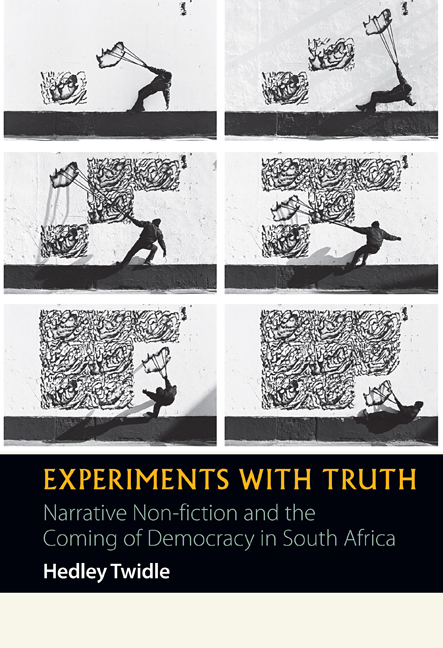Book contents
- Frontmatter
- Contents
- Preface: Encountering non-fiction
- 1 Introduction: Historical and theoretical approaches
- 2 Unusable pasts: The secret history of Demetrios Tsafendas: assassin, madman, messenger
- 3 Literatures of betrayal: Confession, collaboration and collapse in post-TRC narrative
- 4 In search of lost archives: Nostalgia, heterodoxy and the work of memory
- 5 A very strange relationship: Ambition, seduction and scandal in post-apartheid life writing
- 6 Some claim to intimacy: Political biography and the limits of the liberal imagination
- 7 In short, there are problems: Literary journalism in the postcolony
- 8 Unknowable communities: Necessary fictions and broken contracts in the heart of the country
- 9 A new more honest code: Memoirs of the ‘born frees’ and the futures of non-fiction
- 10 Afterword: The extracurriculum
- Bibliography
- Index
- Miscellaneous Endmatter
9 - A new more honest code: Memoirs of the ‘born frees’ and the futures of non-fiction
Published online by Cambridge University Press: 11 September 2020
- Frontmatter
- Contents
- Preface: Encountering non-fiction
- 1 Introduction: Historical and theoretical approaches
- 2 Unusable pasts: The secret history of Demetrios Tsafendas: assassin, madman, messenger
- 3 Literatures of betrayal: Confession, collaboration and collapse in post-TRC narrative
- 4 In search of lost archives: Nostalgia, heterodoxy and the work of memory
- 5 A very strange relationship: Ambition, seduction and scandal in post-apartheid life writing
- 6 Some claim to intimacy: Political biography and the limits of the liberal imagination
- 7 In short, there are problems: Literary journalism in the postcolony
- 8 Unknowable communities: Necessary fictions and broken contracts in the heart of the country
- 9 A new more honest code: Memoirs of the ‘born frees’ and the futures of non-fiction
- 10 Afterword: The extracurriculum
- Bibliography
- Index
- Miscellaneous Endmatter
Summary
On 17 August 2015, the annual Ruth First Memorial Lecture was held at the Great Hall of the University of the Witwatersrand. Themed around ‘Race: Lived Experiences and Contemporary Conversations’, it was made up of two presentations which marked a generational break with the speakers of previous years. The first was by Panashe Chigumadzi, a student, activist and novelist who dealt with the experience of so-called ‘Coconuts’: young, relatively privileged black South Africans who are (so the self-mocking, semi-endearing term implies) white on the inside as a result of having attended schools that were either state-funded ‘former Model C’ (i.e. once whites-only) or private.
‘We all know what a Coconut is, don't we? It's a person who speaks like this’, she remarked, drawing laughter from the audience at the start of an address that spliced together autobiography, personal interviews and critical theory from Du Bois to Malcolm X to chart a psychic journey from accommodation and assimilation to militancy and activism (‘Of Coconuts’, online). As members of the ‘born free’ generation onto which a fantasy of a colour-blind, post-race South Africa had been projected, ‘we were’, she continued, ‘a conduit for the country's absolution from the real work of reconciliation’; but instead of becoming ‘the trusted go-betweens between black and white, we are turning to conceptions of blackness and mobilising anger at the very concept of the Rainbow Nation.’
The second half of the event began with Sisonke Msimang, a versatile social commentator, essayist and (as of 2017) the author of the widely praised memoir Always Another Country. She delivered her reflections on the politics and possibilities of inter-racial friendship in South Africa in collaboration with poet, actor and theatre-maker Lebogang Mashile, who performed extracts from a range of literary works, many of them drawn from the archive of South African non-fiction. These included the prison memories of Helen Joseph and Lilian Ngoyi (leaders of the 1956 Women's March against the pass laws); memoir, autofiction and essays by Rian Malan, Sindiwe Magona and Nadine Gordimer; Njabulo Ndebele's reflections on race and intimacy in Fine Lines from the Box; Xolela Mangcu's media columns about the University of Cape Town as it debated what to do with a statue of Cecil Rhodes.
- Type
- Chapter
- Information
- Experiments with TruthNarrative Non-fiction and the Coming of Democracy in South Africa, pp. 185 - 212Publisher: Boydell & BrewerPrint publication year: 2019

